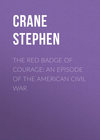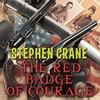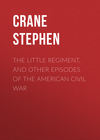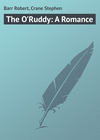Читать книгу: «Active Service», страница 8
CHAPTER XIII
COLEMAN suddenly found himself looking upon his pallid dragoman. He saw that he had been asleep crouched at the foot of the tree. Without any exchange of speech at all he knew there had been alarming noises. Then shots sounded from nearby. Some were from rifles aimed in that direction and some were from rifles opposed to them. This was distinguishable to the experienced man, but all that Coleman knew was that the conditions of danger were now triplicated. Unconsciously he stretched his hands in supplication over his charges. "Don't move! Don't move! And keep close to the ground!" All heeded him but Marjory. She still sat straight. He himself was on his feet, but he now knew the sound of bullets, and he knew that no bullets had spun through the trees. He could not see her distinctly, but it was known to him in some way that she was mutinous. He leaned toward her and spoke as harshly as possible. "Marjory, get down! " She wavered for a moment as if resolved to defy him. As he turned again to peer in the direction of the firing it went through his mind that she must love him very much indeed. He was assured of it. It must have been some small outpour between nervous pickets and eager hillsmen, for it ended in a moment. The party waited in abasement for what seemed to them a time, and the blue dawn began, to laggardly shift the night as they waited. The dawn itself seemed prodigiously long in arriving at anything like discernible landscape. When this was consummated, Coleman, in somewhat the manner of the father of a church, dealt bits of chocolate out to the others. He had already taken the precaution to confer with the dragoman, so he said : " Well, come ahead. We'll make a try for it." They arose at his bidding and followed him to the road. It was the same broad, white road, only that the white was in the dawning something like the grey of a veil. It took some courage to venture upon this thoroughfare, but Coleman stepped out-after looking quickly in both directions. The party tramped to where the horses had been left, and there they were found without change of a rope. Coleman rejoiced to see that his dragoman now followed him in the way of a good lieutenant. They both dashed in among the trees and had the horses out into the road in a twinkle. When Coleman turned to direct that utterly subservient, group he knew that his face was drawn from hardship and anxiety, but he saw everywhere the same style of face with the exception of the face of Marjory, who looked simply of lovely marble. He noted with a curious satisfaction, as if the thing was a tribute to himself, that his macintosh was over the professor's shoulder, that Marjory and her mother were each carrying a blanket, and that, the corps of students had dutifully brought all the traps which his dragoman had forgotten. It was grand.
He addressed them to say: " Now, approaching outposts is very dangerous business at this time in the morning. So my man, who can talk both Greek and Turkish, will go ahead forty yards, and I will follow somewhere between him and you. Try not to crowd forward."
He directed the ladies upon their horses and placed the professor upon the little grey nag. Then they took up their line of march. The dragoman had looked somewhat dubiously upon this plan of having him go forty yards in advance, but he had the utmost confidence in this new Coleman, whom yesterday he had not known. Besides, he himself was a very gallant man indeed, and it befitted him to take the post of danger before the eyes of all these foreigners. In his new position he was as proud and unreasonable as a rooster. He was continually turning his head to scowl back at them, when only the clank of hoofs was sounding. An impenetrable mist lay on the valley and the hill-tops were shrouded. As for the people, they were like mice. Coleman paid no attention to the Wainwright party, but walked steadily along near the dragoman.
Perhaps the whole thing was a trifle absurd, but to a great percentage, of the party it was terrible. For instance, those eight boys, fresh from a school, could in no wise gauge the dimensions. And if this was true of the students, it was more distinctly true of Marjory and her mother. As for the professor, he seemed Weighted to the earth by his love and his responsibility.
Suddenly the dragoman wheeled and made demoniac signs. Coleman half-turned to survey the main body, and then paid his attention swiftly to the front. The white road sped to the top of a hill where it seemed to make a rotund swing into oblivion. The top of the curve was framed in foliage, and therein was a horseman. He had his carbine slanted on his thigh, and his bridle-reins taut. Upon sight of them he immediately wheeled and galloped down the other slope and vanished.
The dragoman was throwing wild gestures into the air. As Coleman looked back at the Wainwright party he saw plainly that to an ordinary eye they might easily appear as a strong advance of troops. The peculiar light would emphasize such theory. The dragoman ran to him jubilantly, but he contained now a form of intelligence which caused him to whisper; " That was one Greek. That was one Greek-what do you call—sentree? "
Coleman addressed the others. He said: "It's all right. Come ahead. That was a Greek picket. There is only one trouble now, and that is to approach them easy-do you see-easy."
His obedient charges came forward at his word. When they arrived at the top of this rise they saw nothing. Coleman was very uncertain. He was not sure that this picket had not carried with him a general alarm, and in that case there would soon occur a certain amount of shooting. However, as far as he understood the business, there was no way but forward. Inasmuch as he did not indicate to the Wainwright party that he wished them to do differently, they followed on doggedly after him and the dragoman. He knew now that the dragoman's heart had for the tenth time turned to dog-biscuit, so he kept abreast of him. And soon together they walked into a cavalry outpost, commanded by no less a person than the dashing young captain, who came laughing out to meet them.
Suddenly losing all colour of war, the condition was now such as might occur in a drawing room. Coleman felt the importance of establishing highly conventional relations between the captain and the Wainwright party. To compass this he first seized his dragoman, and the dragoman, enlightened immediately, spun a series of lies which must have led the captain to believe that the entire heart of the American republic had been taken out of that western continent and transported to Greece. Coleman was proud of the captain, The latter immediately went and bowed in the manner of the French school and asked everybody to have a cup of coffee, although acceptation would have proved his ruin and disgrace. Coleman refused in the name of courtesy. He called his party forward, and now they proceeded merely as one crowd. Marjory had dismounted in the meantime.
The moment was come. Coleman felt it. The first rush was from the students. Immediately he was buried in a thrashing mob of them. "Good boy! Good boy! Great man! Oh, isn't he a peach? How did he do it? He came in strong at the finish ! Good boy, Coleman!" Through this mist of glowing youthful congratulatioin he saw the professor standing at the outskirts with direct formal thanks already moving on his lips, while near him his wife wept joyfully. Marjory was evidently enduring some inscrutable emotion.
After all, it did penetrate his mind that it was indecent to accept all this wild gratitude, but there was built within him no intention of positively declaring himself lacking in all credit, or at least, lacking in all credit in the way their praises defined it. In truth he had assisted them, but he had been at the time largely engaged in assisting himself, and their coming had been more of a boon to his loneliness than an addition to his care. However, he soon had no difficulty in making his conscience appropriate every line in these hymns sung in his honour. The students, curiously wise of men, thought his conduct quite perfect. " Oh, say, come off ! " he protested. " Why, I didn't do anything. You fellows are crazy. You would have gotten in all right by yourselves. Don't act like asses-"
As soon as the professor had opportunity he came to Coleman. He was a changed little man, and his extraordinary bewilderment showed in his face. It was the disillusion and amazement of a stubborn mind that had gone implacably in its one direction and found in the end that the direction was all wrong, and that really a certain mental machine had not been infallible. Coleman remembered what the American minister in Athens had described of his protests against the starting of the professor's party on this journey, and of the complete refusal of the professor to recognise any value in the advice. And here now was the consequent defeat. It was mirrored in the professor's astonished eyes. Coleman went directly to his dazed old teacher. " Well, you're out of it now, professor," he said warmly. " I congratulate you on your escape, sir." The professor looked at him, helpless to express himself, but the correspondent was at that time suddenly enveloped in the hysterical gratitude of Mrs. Wainwright, who hurled herself upon him with extravagant manifestations. Coleman played his part with skill. To both the professor and Mrs. Wainwright his manner was a combination of modestly filial affection and a pretentious disavowal of his having done anything at all. It seemed to charm everybody but Marjory. It irritated him to see that she was apparently incapable of acknowledging that he was a grand man.
He was actually compelled to go to her and offer congratulations upon her escape, as he had congratulated the professor. If his manner to her parents had been filial, his manner to her was parental. " Well, Marjory," he said kindly, "you have been in considerable danger. I suppose you're glad to be through with it." She at that time made no reply, but by her casual turn he knew that he was expected to walk along by her side. The others knew it, too, and the rest of the party left them free to walk side by side in the rear.
" This is a beautiful country here-abouts if one gets a good chance to see it," he remarked. Then he added: "But I suppose you had a view of it when you were going out to Nikopolis? "
She answered in muffled tones. "Yes, we thought it very beautiful."
Did you note those streams from the mountains " That seemed to me the purest water I'd ever seen, but I bet it would make one ill to drink it. There is, you know, a prominent German chemist who has almost proven that really pure water is practical poison to the human stomach."
"Yes ? " she said.
There was a period of silence, during which he was perfectly comfortable because he knew that she was ill at ease. If the silence was awkward, she was suffering from it. As for himself, he had no inclination to break it. His position was, as far as the entire Wainwright party was concerned, a place where he could afford to wait. She turned to him at last. "Of course, I know how much you have done for us, and I want you to feel that we all appreciate it deeply-deeply." There was discernible to the ear a certain note of desperation.
" Oh, not at all," he said generously. " Not at all. I didn't do anything. It was quite an accident. Don't let that trouble you for a moment."
"Well, of course you would say that," she said more steadily. " But I-we-we know how good and how-brave it was in you to come for us, and I—we must never forget it."
As a matter of fact," replied Coleman, with an appearance of ingenuous candor, " I was sent out here by the Eclipse to find you people, and of course I worked rather hard to reach you, but the final meeting was purely accidental and does not redound to my credit in the least."
As he had anticipated, Marjory shot him a little glance of disbelief. " Of course you would say that," she repeated with gloomy but flattering conviction.
" Oh, if I had been a great hero," he said smiling, "no doubt I would have kept up this same manner which now sets so well upon me, but I am telling you the truth when I say that I had no part in your rescue at all."
She became slightly indignant. " Oh, if you care to tell us constantly that you were of no service to us, I don't see what we can do but continue to declare that you were."
Suddenly he felt vulgar. He spoke to her this time with real meaning. " I beg of 'you never to mention it again. That will be the best way."
But to this she would not accede. "No, we will often want to speak of it."
He replied "How do you like Greece? Don't you think that some of these ruins are rather out of shape in the popular mind? Now, for my part, I would rather look at a good strong finish at a horserace than to see ten thousand Parthenons in a bunch."
She was immediately in the position of defending him from himself. "You would rather see no such thing. You shouldn't talk in that utterly trivial way. I like the Parthenon, of course, but I can't think of it now because my head. is too full of my escape from where I was so-so frightened."
Coleman grinned. " Were you really frightened?"
" Naturally," she answered. " I suppose I was more frightened for mother and father, but I was frightened enough for myself. It was not-not a nice thing."
"No, it wasn't," said Coleman. "I could hardly believe my senses, when the minister at Athens told me that, you all had ventured into such a trap, and there is no doubt but what you can be glad that you are well out of it."
She seemed to have some struggle with herself and then she deliberately said: "Thanks to you."
Coleman embarked on what he intended to make a series of high-minded protests. " Not at all-" but at that moment the dragoman whirled back from the van-guard with a great collection of the difficulties which had been gathering upon him. Coleman was obliged to resign Marjory and again take up the active leadership. He disposed of the dragoman's difficulties mainly by declaring that they were not difficulties at all. He had learned that this was the way to deal with dragomen. The fog had already lifted from the valley and, as they passed along the wooded mountain-side the fragrance of leaves and earth came to them. Ahead, along the hooded road, they could see the blue clad figures of Greek infantrymen. Finally they passed an encampment of a battalion whose line was at a right angle to the highway. A hundred yards in advance was the bridge across the Louros river. And there a battery of artillery was encamped. The dragoman became involved in all sorts of discussions with other Greeks, but Coleman stuck to his elbow and stifled all aimless oration. The Wainwright party waited for them in the rear in an observant but patient group.
Across a plain, the hills directly behind Arta loomed up showing the straight yellow scar of a modern entrenchment. To the north of Arta were some grey mountains with a dimly marked road winding to the summit. On one side of this road were two shadows. It took a moment for the eye to find these shadows, but when this was accomplished it was plain that they were men. The captain of the battery explained to the dragoman that he did not know that they were not also Turks. In which case the road to Arta was a dangerous path. It was no good news to Coleman. He waited a moment in order to gain composure and then walked back to the Wainwright party. They must have known at once from his peculiar gravity that all was not well. Five of the students and the professor immediately asked: "What is it?"
He had at first some old-fashioned idea of concealing the ill tidings from the ladies, but he perceived what flagrant nonsense this would be in circumstances in which all were fairly likely to incur equal dangers, and at any rate he did not see his way clear to allow their imagination to run riot over a situation which might not turn out to be too bad. He said slowly: " You see those mountains over there? Well, troops have been seen there and the captain of this battery thinks they are Turks. If they are Turks the road to Arta is distinctly-er-unsafe."
This new blow first affected the Wainwright party as being too much to endure. " They thought they had gone through enough. This was a general sentiment. Afterward the emotion took colour according to the individual character. One student laughed and said: " Well, I see our finish."
Another student piped out: " How do they know they are Turks? What makes them think they are Turks "
Another student expressed himself with a sigh. "This is a long way from the Bowery."
The professor said nothing but looked annihilated; Mrs. Wainwright wept profoundly; Marjory looked expectantly toward Coleman.
As for the correspondent he was adamantine and reliable and stern, for he had not the slightest idea that those men on the distant hill were Turks at all.
CHAPTER XIV
"OH," said a student, " this game ought to quit. I feel like thirty cents. We didn't come out here to be pursued about the country by these Turks. Why don't they stop it ?"
Coleman was remarking: "Really, the only sensible thing to do now is to have breakfast. There is no use in worrying ourselves silly over this thing until we've got to."
They spread the blankets on the ground and sat about a feast of bread, water cress and tinned beef. Coleman was the real host, but he contrived to make the professor appear as that honourable person. They ate, casting their eyes from time to time at the distant mountain with its two shadows. People began to fly down the road from Jannina, peasants hurriedly driving little flocks, women and children on donkeys and little horses which they clubbed unceasingly. One man rode at a gallop, shrieking and flailing his arms in the air. They were all Christian peasants of Turkey, but they were in flight now because they did not wish to be at home if the Turk was going to return and reap revenge for his mortification. The Wainwright party looked at Coleman in abrupt questioning.
"Oh, it's all right," he said, easily. "They are always taking on that way."
Suddenly the dragoman gave a shout and dashed up the road to the scene of a melee where a little ratfaced groom was vociferously defending three horses from some Greek officers, who as vociferously were stating their right to requisition them. Coleman ran after his dragoman. There was a sickening pow-wow, but in the end Coleman, straight and easy in the saddle, came cantering back on a superb open-mouthed snorting bay horse. He did not mind if the half-wild animal plunged crazily. It was part of his role. "They were trying to steal my horses," he explained. He leaped to the ground, and holding the horse by the bridle, he addressed his admiring companions. " The groom- the man who has charge of the horses -says that he thinks that the people on the mountain-side are Turks, but I don't see how that is possible. You see-" he pointed wisely-" that road leads directly south to Arta, and it is hardly possible that the Greek army would come over here and leave that approach to Arta utterly unguarded. It would be too foolish. They must have left some men to cover it, and that is certainly what those troops are. If you are all ready and willing, I don't see anything to do but make a good, stout-hearted dash for Arta. It would be no more dangerous than to sit here." The professor was at last able to make his formal speech. " Mr. Coleman," he said distinctly, "we place ourselves entirely in your hands." It was some. how pitiful. This man who, for years and years had reigned in a little college town almost as a monarch, passing judgment with the air of one who words the law, dealing criticism upon the universe as one to whom all things are plain, publicly disdaining defeat as one to whom all things are easy-this man was now veritably appealing to Coleman to save his wife, his daughter and himself, and really declared himself de. pendent for safety upon the ingenuity and courage of the correspondent.
The attitude of the students was utterly indifferent. They did not consider themselves helpless at all. they were evidently quite ready to withstand anything but they looked frankly up to Coleman as their intelligent leader. If they suffered any, their only expression of it was in the simple grim slang of their period.
" I wish I was at Coney Island."
" This is not so bad as trigonometry, but it's worse than playing billiards for the beers."
And Coke said privately to Coleman: " Say, what in hell are these two damn peoples fighting for, anyhow? "
When he saw that all opinions were in favour of following him loyally, Coleman was impelled to feel a responsibility. He was now no errant rescuer, but a properly elected leader of fellow beings in distress. While one of the students held his horse, he took the dragoman for another consultation with the captain of the battery. The officer was sitting on a large stone, with his eyes fixed into his field glasses. When again questioned he could give no satisfaction as to the identity of the troops on the distant mountain. He merely shrugged his shoulders and said that if they were Greeks it was very good, but if they were Turks it was very bad. He seemed more occupied in trying to impress the correspondent that it was a matter of soldierly indifference to himself. Coleman, after loathing him sufficiently in silence, returned to the others and said: " Well, we'll chance it."
They looked to him to arrange the caravan. Speaking to the men of the party he said: " Of course, any one of you is welcome to my horse if you can ride it, but-if you're not too tired-I think I had myself better ride, so that I can go ahead at times."
His manner was so fine as he said this that the students seemed fairly to worship him. Of course it had been most improbable that any of them could have ridden that volcanic animal even if one of them had tried it.
He saw Mrs. Wainwright and Marjory upon the backs of their two little natives, and hoisted the professor into the saddle of the groom's horse, leaving instructions with the servant to lead the animal always and carefully. He and the dragoman then mounted at the head of the procession, and amid curious questionings from the soldiery they crossed the bridge and started on the trail to Arta. The rear was brought up by the little grey horse with the luggage, led by one student and flogged by another.
Coleman, checking with difficulty the battling disposition of his horse, was very uneasy in his mind because the last words of the captain of the battery had made him feel that perhaps on this ride he would be placed in a position where only the best courage would count, and he did not see his way clear to feeling very confident about his conduct in such a case. Looking back upon the caravan, he saw it as a most unwieldy thing, not even capable of running away. He hurried it with sudden, sharp contemptuous phrases.
On the. march there incidentally flashed upon him a new truth. More than half of that student band were deeply in love with Marjory. Of course, when he had been distant from her he had had an eternal jealous reflection to that effect. It was natural that he should have thought of the intimate camping relations between Marjory and these young students with a great deal of bitterness, grinding his teeth when picturing their opportunities to make Marjory fall in love with some one of them. He had raged particularly about Coke, whose father had millions of dollars. But he had forgotten all these jealousies in the general splendour of his exploits. Now, when he saw the truth, it seemed. to bring him back to his common life and he saw himself suddenly as not being frantically superior in any way to those other young men. The more closely he looked at this last fact, the more convinced he was of its truth. He seemed to see that he had been impropererly elated over his services to the Wainwrights, and that, in the end, the girl might fancy a man because the man had done her no service at all. He saw his proud position lower itself to be a pawn in the game. Looking back over the students, he wondered which one Marjory might love. This hideous Nikopolis had given eight men chance to win her. His scorn and his malice quite centered upon Coke, for he could never forget that the man's father had millions of dollars. The unfortunate Coke chose that moment to address him querulously : "Look here, Coleman, can't you tell us how far it is to Arta ? "
"Coke," said Coleman, " I don't suppose you take me for a tourist agency, but if you can only try to distinguish between me and a map with the scale of miles printed in the lower left- hand corner, you will not contribute so much to the sufferings of the party which you now adorn."
The students within hearing guffawed and Coke retired, in confusion.
The march was not rapid. Coleman almost wore out his arms holding in check his impetuous horse. Often the caravan floundered through mud, while at the same time a hot, yellow dust came from the north.
They were perhaps half way to Arta when Coleman decided that a rest and luncheon were the things to be considered. He halted his troop then in the shade of some great trees, and privately he bade his dragoman prepare the best feast which could come out of those saddle-bags fresh from Athens. The result was rather gorgeous in the eyes of the poor wanderers. First of all there were three knives, three forks, three spoons, three tin cups and three tin plaies, which the entire party of twelve used on a most amiable socialistic principle. There were crisp, salty biscuits and olives, for which they speared in the bottle. There was potted turkey, and potted ham, and potted tongue, all tasting precisely alike. There were sardines and the ordinary tinned beef, disguised sometimes with onions, carrots and potatoes. Out of the saddle-bags came pepper and salt and even mustard. The dragoman made coffee over a little fire of sticks that blazed with a white light. The whole thing was prodigal, but any philanthropist would have approved of it if he could have seen the way in which the eight students laid into the spread. When there came a polite remonstrance-notably from Mrs. Wainwright-Coleman merely pointed to a large bundle strapped back of the groom's saddle. During the coffee he was considering how best to get the students one by one out of the sight of the Wainwrights where he could give them good drinks of whisky.
There was an agitation on the road toward Arta. Some people were coming on horses. He paid small heed until he heard a thump of pausing hoofs near him, and a musical voice say: "Rufus! "
He looked up quickly, and then all present saw his eyes really bulge. There on a fat and glossy horse sat Nora Black, dressed in probably one of the most correct riding habits which had ever been seen in the East. She was smiling a radiant smile, which held the eight students simpty spell-bound. They would have recognised her if it had not been for this apparitional coming in the wilds of southeastern Europe. Behind her were her people-some servants and an old lady on a very little pony. " Well, Rufus? " she said.
Coleman made the mistake of hesitating. For a fraction of a moment he had acted as if he were embarrassed, and was only going to nod and say: " How d'do ?"
He arose and came forward too late. She was looking at him with a menacing glance which meant difficulties for him if he was not skilful. Keen as an eagle, she swept her glance over the face and figure of Marjory. Without. further introduction, the girls seemed to understand that they were enemies.
Despite his feeling of awkwardness, Coleman's mind was mainly occupied by pure astonishment. "Nora Black? " he said, as if even then he could not believe his senses. " How in the world did you get down here ?
She was not too amiable, evidently, over his reception, and she seemed to know perfectly that it was in her power to make him feel extremely unpleasant. " Oh, it's not so far," she answered. " I don't see where you come in to ask me what I'm doing here. What are you doing here? " She lifted her eyes and shot the half of a glance at Marjory. Into her last question she had interjected a spirit of ownership in which he saw future woe. It turned him cowardly. " Why, you know I was sent up here by the paper to rescue the Wainwright party, and I've got them. I'm taking them to Arta. But why are you here?"
" I am here," she said, giving him the most defiant of glances, " principally to look for you."
Even the horse she rode betrayed an intention of abiding upon that spot forever. She had made her communication with Coleman appear to the Wainwright party as a sort of tender reunion.
Coleman looked at her with a steely eye. "Nora, you can certainly be a devil when you choose."
" Why don't you present me to your friends? Mis,; Nora Black, special correspondent of the New York Daylighi, if you please. I belong to your opposition. I am your rival, Rufus, and I draw a bigger salary-see? Funny looking gang, that. Who is the old Johnnie in the white wig?"
"Er-where you goin'-you can't "-blundered Coleman miserably "Aw-the army is in retreat and you must go back to- don't you see?"
"Is it?" she agked. After a pause she added coolly: "Then I shall go back to Arta with you and your precious Wainwrights."
Покупайте книги и получайте бонусы в Литрес, Читай-городе и Буквоеде.
Участвовать в бонусной программе


















